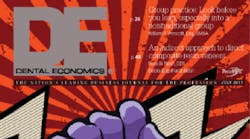The dentist as inventor: Getting dental innovations out of the dentist's head and into the marketplace
Throughout the years, I’ve had the pleasure of many discussions with dental professionals about their ideas for dental product innovations. I’ve tried to be a good listener in these situations, but I have to insist that we both sign nondisclosure agreements before we get too far into the details.
More often than not, the ideas shared with me have been good ones. I think every dental professional has at least one good idea to improve what is being used in practice now, and many of those ideas are patentable. I think it’s a shame that most ideas do not see the light of day. Dental professionals are no doubt like other inventors in that they’re afraid someone will steal their ideas.
We live in a time when there is a huge need for value-added work. Lawyers, financiers, distributers, and companies such as Amazon and Ali-Baba are primarily in the business of moving “stuff” around, but are not involved in actually creating the “stuff.” There is a real need, especially in the dental marketplace, for dental professionals to come together with manufacturers to improve the field by creating “stuff.”
A friend and dentist from Boston recently showed me how he took one of Microcopy’s patented products, modified it, and used it for a completely different purpose. He partnered with our senior innovation engineer, Emily Brayman, to develop a new product and jointly file for a patent. Hopefully this will be profitable for both him and Microcopy. The product is called Proxi-Chek, and it’s a handy little tool that should make a huge difference in helping dentists successfully seat crowns. This innovative dentist could have used his idea without sharing it with the rest of us, but thankfully he shared. Now we’re all happy with the result, and we have a great friend who’s looking forward to working with us on future projects.
This is a good example of a dentist working with a manufacturer. Conversely, I have another friend, Daniel Kim, DDS, from Vancouver, Washington, who has so many ideas that he created his own manufacturing company, ContacEZ, to make and distribute his products. I’m a big fan of his and have seen how his model can work extremely well.
I want to encourage all dental professionals to get their ideas out of their heads and into the marketplace.
Here are several key points I want to share:
- Don’t give up on your ideas. Get them out there. There is someone who can help.
- Don’t let the fear that someone will steal your idea stop you from sharing it. There are many reputable companies looking for good ideas. Find one and move forward.
- You are not too old. The New York Times recently reported on a study by Georgia Tech and Hitotsubashi University in Japan that showed the highest value patents often come from inventors over the age of 55.1
- Insist on signing nondisclosure documents. Don’t work with anyone who won’t sign one.
- Present your idea in a professional manner. Mentioning that you have “an idea” to a busy manufacturer working the booth at a dental convention, and then not following up, is not a professional approach. (Yes, this actually happens.)
- Make sure you can clearly explain what problem the product solves, or better, what job it performs.
- If your first idea doesn’t get very far, don’t be discouraged. Learn from it and move on to the next idea.
- If you choose to go it alone, don’t. Make sure to enlist the services of a good patent attorney.
- If you find the right company, all you need to provide is a strong description of what the product does, and the company will do the rest. Perhaps you don’t need a product idea at all. Maybe you can just share your frustration or pain point with a manufacturer, and they can do the rest.
- Finally, remember that a logical and linear mind capable of a technical invention is often not the same mind needed to emotionally connect with would-be customers. Good marketing and branding people can make a colossal difference in your success.
Microcopy has a well-developed innovation process called MIPS that allows people to receive, review, design, prototype, and patent ideas. These are then quickly evaluated using the company’s key opinion leaders in a way that is financially rewarding for both the company and the person with the idea. Microcopy’s system is highly focused, and it weeds out products that are not able to be sampled or that don’t match up with the company’s core business.
The MIPS process was developed internally to specifically address the issue that small companies have when developing their ideas into sellable products. Over the years, Microcopy has launched a number of products, and dentists often respond with, “Why didn’t I think of that?” That’s about the best compliment there is. Microcopy’s MIPS process has been very successful and useful in terms of bringing new products to market. Other dental companies may have similar capabilities.
Clayton Christensen, a prominent Harvard Business School professor and expert on disruptive innovation, describes “jobs theory” in his latest book, Competing Against Luck: “When we buy a product, we essentially ‘hire’ something to get a job done.”2 I ask one question of all you dental professionals, “Who better than you knows how to design a product that does a necessary job?”
References
1. Walsh JP, Nagaoka S. http://www.prism.gatech.edu/~jwalsh6/inventors/WhoWalshNagaoka090707FinalUS.pdf. RIETI Discussion Paper Series 09-E -034. Published July 5, 2009.
2. Christensen CM, Hall T, Dillon K, Duncan DS. Competing Against Luck: The Story of Innovation and Customer Choice. New York, New York: Harper Business; 2016:xii.
Perry L. Parke is president of Microcopy Dental, headquartered in Atlanta, Georgia. For more than 45 years, Microcopy has provided single-patient-use products to the dental industry. Mr. Parke’s highly-dedicated staff works to develop new ideas, brand those ideas, and bring them to the dental market. To see Microcopy’s full line of innovative dental products, visit microcopydental.com, or call (800) 235-1863.

